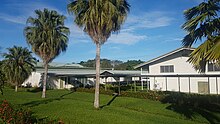
The economy of Papua New Guinea (PNG) is largely underdeveloped with the vast majority of the population living below the poverty line. However, according to the Asian Development Bank its GDP is expected to grow 3.4% in 2022 and 4.6% in 2023. It is dominated by the agricultural, forestry, and fishing sector and the minerals and energy extraction sector. The agricultural, forestry, and fishing sector accounts for most of the labour force of PNG while the minerals and energy extraction sector, including gold, copper, oil and natural gas is responsible for most of the export earnings.

The University of Natural Resources and Life Sciences, Vienna, or simply BOKU, founded in 1872, is an education and research centre for renewable resources in Vienna, Austria. BOKU combines expertise in the fields of natural sciences, engineering and biotechnology as well as social and economic sciences. In research and teaching, it focuses on

The University of Papua New Guinea (UPNG) is a university located in Port Moresby, capital of Papua New Guinea. It was established by ordinance of the Australian administration in 1965. This followed the Currie Commission which had enquired into higher education in Papua New Guinea. The University of Papua New Guinea Act No. 18, 1983 bill repealing the old Ordinance was passed by the National Parliament in August 1983.

Education in Papua New Guinea is managed through nineteen provinces and two district organisational units. It is tuition-free and attendance is not compulsory.
The Tolai are the indigenous people of the Gazelle Peninsula and the Duke of York Islands of East New Britain in the New Guinea Islands region of Papua New Guinea. They are ethnically close kin to the peoples of adjacent New Ireland and tribes like the Tanga people and are thought to have migrated to the Gazelle Peninsula in relatively recent times, displacing the Baining people who were driven westwards.
The Papua New Guinean honours system is the main system of honouring citizens of Papua New Guinea for their services to the country; it consists of three Orders and several medals. After independence, Papua New Guinea used the Imperial honours system, however, in recognition of the nation's 30th anniversary, a new awards system was adopted. The official announcement of its creation was made by Prime Minister Sir Michael Somare on 12 November 2004 and the first investitures were performed by the Princess Royal in early October 2005. The Imperial honours system is still in use as well, however, and the King issues a Papua New Guinean List as part of every Birthday and New Year Honours List.

Papua New Guinea together with the West Papua region of Indonesia make up a major tropical wilderness area that still contains 5% of the original and untouched tropical high-biodiversity terrestrial ecosystems. PNG in itself contains over 5% of the world's biodiversity in less than 1% of the world's total land area. The flora of New Guinea is unique because it has two sources of origin; the Gondwana flora from the south and flora with Asian origin from the west. As a result, New Guinea shares major family and genera with Australia and the East Asia, but is rich in local endemic species. The endemicity is a result of mountainous isolation, topographic and soil habitat heterogeneity, high forest disturbance rates and abundant aseasonal rainfall year round. PNG boasts some 15–21,000 higher plants, 3,000 species of orchids, 800 species of coral, 600 species of fish, 250 species of mammals and 760 species of birds and 8 species of tree-kangaroos out of which 84 genera of animals are endemic. Ecosystems range from lowland forests to montane forests, alpine flora down to coastal areas which contains some of the most extensive pristine mangrove areas in the world. Much of this biodiversity has remained intact for thousands of years because the ruggedness of the terrain made the interior lands inaccessible; furthermore low population density and restrictions on the effectiveness of traditional tools, ensured that these biodiversity was never overexploited.

Sokoine University of Agriculture (SUA) is a public university in Morogoro, Tanzania, specializing in agriculture. The university is named after the country's second prime minister Edward Sokoine.

Deforestation in Papua New Guinea has been extensive and in recent decades from 2001 to 2020, Papua New Guinea (PNG) lost 1.57Mha of tree cover, equivalent to a 3.7% decrease in tree cover since 2000, and 1.15Gt of CO₂e emissions.

Vietnam National University of Agriculture, until 2014 Hanoi University of Agriculture (HUA), is an education and research university specializing in the agricultural sector. The university is located in Trau Quy town, Gia Lam district, a Hanoi suburban area, about 12 km far from Hanoi city centre.
The Zambia Forestry College (ZFC) was established in 1949 to provide technical training in forestry. In the same year, it produced the first forest guards.
South Eastern Kenya University "SEKU" is a public university with its main campus located in Kwa Vonza, Kitui County, Kenya.

The Lilongwe University of Agriculture and Natural Resources (LUANAR) is a university outside Lilongwe, Malawi. It was formed in 2011 by a merger between Bunda College of Agriculture of the University of Malawi and Natural Resources College (NRC).

Víctor Manuel Villalobos Arámbula is an agricultural engineer with a specialty in agronomy who serves as the Secretary of Agriculture and Rural Development (SADER) in the administration of Mexican President Andrés Manuel López Obrador (AMLO).
Elsie Albert is a Papua New Guinean rugby league footballer who plays as a prop for the Parramatta Eels Women in the NRL Women's Premiership.
Sir Charles Lepani is a former public servant and diplomat from Papua New Guinea. He was the country's high commissioner in Australia from 2005 to 2017 and, prior to that, had been its ambassador to both the European Union and several European countries.

Sir Alkan Tololo was the director of Papua New Guinea's education department and the first Papua New Guinean to be chancellor of both the University of Papua New Guinea (UPNG) and the Papua New Guinea University of Technology (Unitech). He also became chancellor of Vudal University, as well as holding diplomatic posts in Australia and Malaysia.










